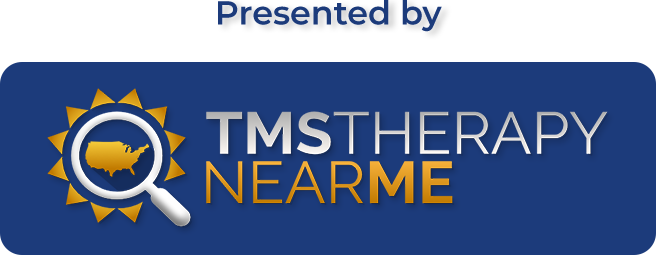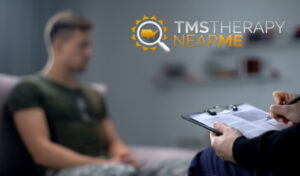Transcranial magnetic stimulation (TMS) offers an alternative, drug-free approach to treating PTSD and has seen success among patients. A study published in the American Journal of Psychiatry found that TMS therapy offered relief to War Veterans with PTSD with 70% of the participants no longer meeting the criteria for PTSD after TMS treatment sessions.
Post-traumatic Stress Disorder (PTSD) is a severe anxiety response to a traumatic experience that can impair and rule your daily life. Whether this event occurred from fighting in the military or a tragic event, it is a common condition that affects thousands of Veterans and people every year.
Transcranial magnetic stimulation (TMS) therapy is a non-invasive treatment that can help treat an array of mental health conditions, including PTSD. TMS uses powerful magnetic fields to make changes in the activity of neurons and ultimately reset, or normalize, brain function. Studies have shown that TMS for Veterans proves to be very successful in treating depression and PTSD, and helps them return to a life uninhibited by the trauma experienced during active duty.
Symptoms of Post Traumatic Stress Disorder
Symptoms of PTSD can include:
- Flashbacks to the traumatizing event accompanied by physical symptoms (sweating, increased heart rate, high cortisol levels)
- Recurring bad dreams about the traumatizing incident
- Avoidance of people, places or things that remind them of the incident
- Feelings of high anxiety, being tense or easily startled
- Sudden verbal outbursts
- Trouble sleeping due to other symptoms
- Negative thoughts, blame and guilt
- Lack of interest in activities once found to be enjoyable
- Distrust of the world
- Inability or fear of speaking
TMS Therapy for Veterans with PTSD
PTSD continues to be a major health concern for millions of Veterans, and can also affect their families or loved ones as well. While serving overseas, many soldiers who have experienced combat or a traumatic event, are haunted and struggle with the continued effect it has on them, keeping them from living happy, healthy lives.
The percentage of Veterans struggling with PTSD is high. With statistics from VA.gov:
- “Operations Iraqi Freedom (OIF) and Enduring Freedom (OEF): About 11-20 out of every 100 Veterans (or between 11-20%) who served in OIF or OEF have PTSD in a given year.
- Gulf War (Desert Storm): About 12 out of every 100 Gulf War Veterans (or 12%) have PTSD in a given year.
- Vietnam War: About 15 out of every 100 Vietnam Veterans (or 15%) were currently diagnosed with PTSD at the time of the most recent study in the late 1980s, the National Vietnam Veterans Readjustment Study (NVVRS). It is estimated that about 30 out of every 100 (or 30%) of Vietnam Veterans have had PTSD in their lifetime”.
Most often, PTSD can also be accompanied by addiction, shame, poor sleep, aggression, mood irregularities, poor physical health, and struggle to live peaceful lives.
How will TMS Therapy help my PTSD?
More than half of patients who struggle with PTSD also struggle with depression. Transcranial magnetic stimulation (TMS) offers an alternative, drug-free approach to not only treating PTSD but depression as well. TMS does not involve surgery or anesthesia and can be administered in a doctor’s office while the patient is awake. TMS therapy uses electromagnetic energy to target the region of the brain that is responsible for mood regulation, decision-making, and impulse control, within the left prefrontal cortex. The magnetic pulses, which are about the same strength as an MRI, are delivered through a coil placed over the scalp and into the brain, where they induce an electrical current. This current stimulates the neurotransmitters that have been functioning at a diminished capacity, resulting in a rebalancing of the brain chemistry, such as dopamine, serotonin, and norepinephrine, which regulate mood. This results in relieving the symptoms related to depression over the course of treatment.
Many people who have been diagnosed with PTSD, have tried multiple forms of treatment with no relief. This makes TMS Therapy a promising alternative. Research has shown that TMS can be very effective in making your symptoms manageable and help those struggling to feel in control over their lives, gain control again. TMS can help bring relief to patients with or without medications.
When will I see results?
For some, TMS Treatment can work in a couple of weeks, for others even sooner. Every patient is different and unique and at Anew Era TMS & Psychiatry, every patient receives a comprehensive, unique mental health plan to suit their needs. Depending on how long they have suffered from PTSD and their individual circumstances, patients should expect to begin to feel better only weeks after.
Treatments take anywhere from 19-40 minutes depending on the unique needs of the patient. During the treatment, you sit comfortably in a chair and a technician will place the coil on your head. After your treatment, you can continue your day as normal. PTSD is an extremely anxious response to trauma and is a very debilitating disorder to live with. If you are struggling or feel like you might have PTSD, take our PTSD quiz, and don’t give up yet! TMS Therapy will help you rediscover the color in life and get you back to feeling like yourself.


